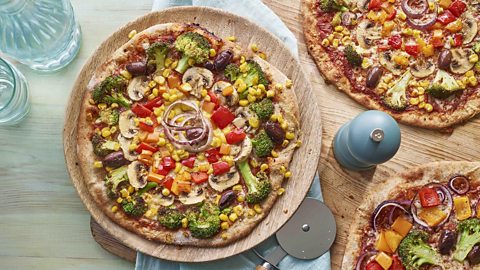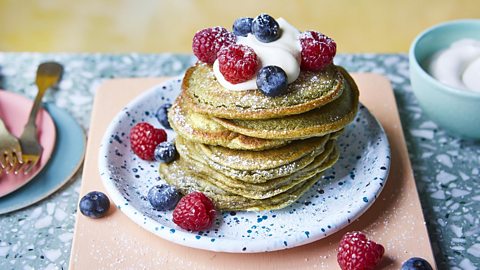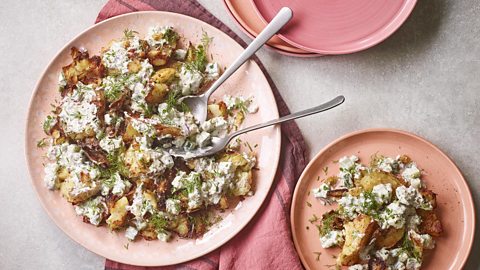Five ways you could improve your gut health

Your gut microbiome, the bacteria, fungi and other microbes living inside your intestines, plays a role in many aspects of your health. A plentiful and diverse colony of helpful bacteria living in your gut can help your body improve immune function, synthesize nutrients, control appetite and improve your mental wellbeing.
You can affect the health of your microbiome (for better or worse!) by the lifestyle choices that you make every day. Microbiome improvement is a “a worthy investment,” says clinician-scientist Dr Sunni Patel, that “you can never be too young or too old” to work on. Environmental factors, such as diet, have been found to have more impact than your genes on the health of your gut. That means, what you eat isn't just nutrition for you, it also feeds and changes the trillions of microbes living and developing in your gut.
You may be able to alter the bacteria in your gut pretty quickly, even within days, but it may take several months and routine support for long-term changes and benefits to show, says Patel.
So how do you do it?
Eat plants!
Plant foods, such as vegetables, fruits, beans, seeds, nuts and wholegrains, contain the fibre your microbes love. The microbes in your gut feed on the fibre you eat that is not digested in the small intestine.
“I recommend aiming for 30 ‘plant points’ every week”, said Dr Megan Rossi, also known as The Gut Health Doctor, which means eating 30 different plants over seven days. A healthy gut has a diverse community of microbes, each of which prefers different foods, so the more variety in your diet, the more diverse bacteria will thrive in your gut. As well as plenty of fresh fruit and veg, you can boost your fibre by switching to wholewheat pasta, brown rice, wholemeal bread.
While it’s best to eat plenty of these fibre-filled foods, increasing the amount of fibre you eat by as little as 6g a day (the amount in a bowl of high-fibre breakfast cereal or 2 thick slices of wholemeal bread) has been found to have a beneficial effect on gut bacteria.
Eating a rainbow of fruits and vegetables may be beneficial too, as this provides you with a variety of phytochemicals, which are compounds produced by plants that may help increase some types of gut bacteria.
Eat the rainbow pizza
Pizza needn’t be an unhealthy treat – this quick and easy recipe is loaded with a colourful array of vegetables

Certain types of fibre and carbohydrates have been found to particularly encourage the growth of friendly bacteria in the gut. Known as pre-biotic foods, these everyday ingredients are a cheap and easy addition to your diet. Bananas, onions and spring onions, garlic, cabbage, leeks, oats, asparagus, nectarines, blueberries and grapefruit are all pre-biotic foods. Following a diverse Mediterranean diet will ensure you eat plenty of these foods.
It's best to increase the amount of fibre you eat slowly, as well as to drink extra water, to avoid wind or bloating symptoms of your diet change. Some people can be sensitive to fibre. If that sounds like you, check with your doctor before making major changes in your diet.
Related stories
Bread is often demonised on social media, but it has the potential to improve our gut health and more
Fill up on ferments
Live yoghurt, kefir, kombucha, kimchi, natto and sauerkraut are examples of fermented foods. These foods have been transformed by microorganisms, such as bacteria and yeast, traditionally as a means of preserving food or adding flavour. Wine, cheese, bread, vinegar and some pickles are also fermented but may no longer contain live bacteria.
A number of studies have suggested the microorganisms from live fermented foods can reach your gut and may influence your microbiome, but more research is needed to understand the benefits that this has for your health. Regardless, many fermented foods are nutritious, containing vitamins, minerals and nutrients, such as fibre, protein and fats, needed for optimum health. And they are delicious.
Fermented foods are cheap and easy to make at home. If buying in the supermarket, check the food labels first, as sauerkraut and kimchi that have been made with vinegar, or have been pasteurised (killing the bacteria), will not contain the beneficial microbes, but will still be tasty.
Limit ultra-processed foods
Professor Tim Spector, of King’s College London, advises limiting the amount of ultra-processed products in your diet, as they have be found to “reduce the diversity of bacteria” in your gut. Highly processed, or ultra-processed, foods have also been associated with “bad” gut microbes by some research that Spector was involved with.
There may be multiple reasons for this. Processed food may crowd out higher-fibre unprocessed foods in the overall diet. The structure of the food, or food matrix, is disrupted by mechanical or chemical processes making the food more rapidly digestible so it doesn't reach the lower intestine. The researchers suggested this could be also be due to the added sugar, fat, salt as well as other additives in these foods. More research needs to be done in this area.
Leave out late night snacking
Leaving a gap of 12 hours between your dinner and breakfast, or intermittent fasting, may benefit your gut microbes, explains Professor Spector, in his book Spoon-Fed. One explanation behind the potential benefit could be that gut microbes may “need to rest and recuperate as part of a daily circadian rhythm, which could be important for our gut health”, writes Spector.
Other studies have found that after Ramadan, people who had been fasting had increased levels of beneficial gut bacteria and more microbial variety (a greater number of different species in the microbiome). However, these studies are small and limited to particular ethnic groups so more research needs to be done in this area.
Not everyone will find it useful or beneficial to change their eating pattern, especially if it means cutting out a healthy wholegrain breakfast and reaching for processed convenience snacks later.
Get some exercise

A small study looked at the impact of a nine-week indoor cycling regime on US college-aged men and found the composition of their microbiome had improved after the trial was over. These results are similar to a number of previous studies, suggesting exercise can alter your composition of gut bacteria, leading to “possible benefits for the host”.
The researchers of the recent paper noted that “exercise, particularly high-intensity exercise, might promote a spontaneous change of dietary choices toward a healthier direction” and therefore, “some changes in the gut microbiota may be due to differences in dietary intake, in addition to the exercise itself”.
A healthier microbiome is just one benefit you can get from healthy eating and regular exercise. Eating a healthy balanced diet can help prevent diet-related illness and will give you the energy and nutrients you need keep active and maintain a healthy weight, according to the NHS.




